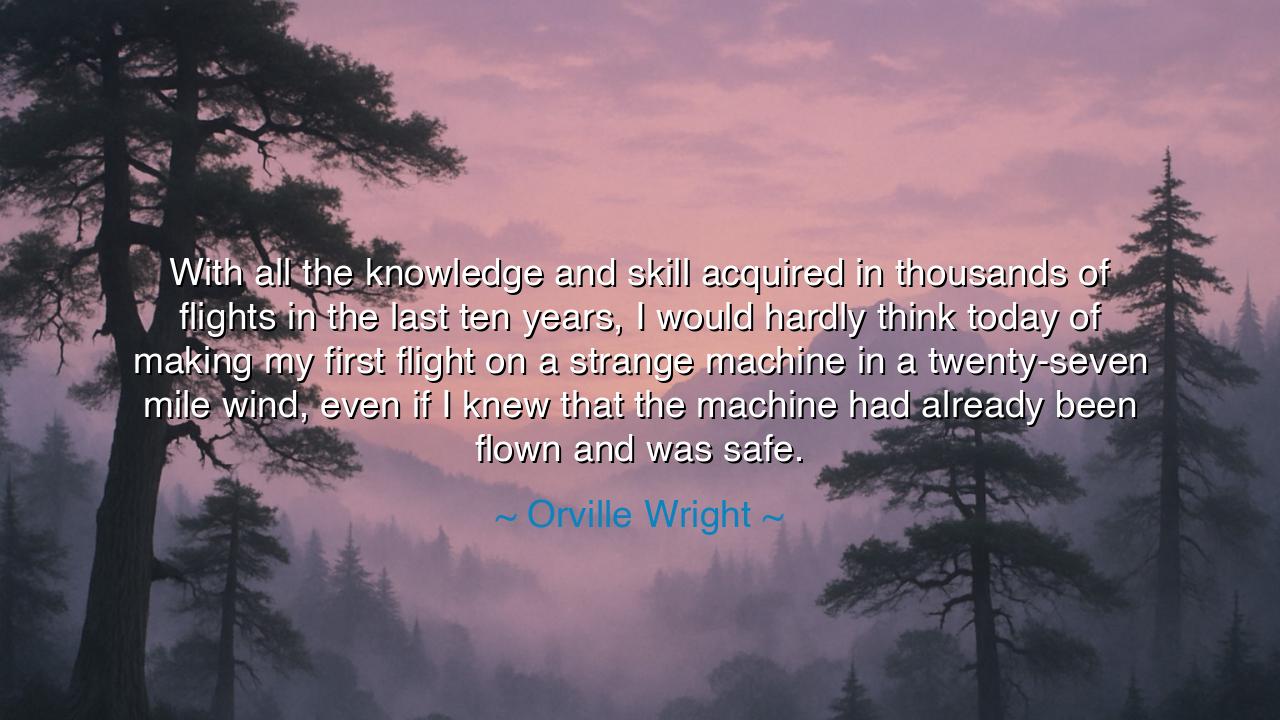
With all the knowledge and skill acquired in thousands of flights
With all the knowledge and skill acquired in thousands of flights in the last ten years, I would hardly think today of making my first flight on a strange machine in a twenty-seven mile wind, even if I knew that the machine had already been flown and was safe.






The words of Orville Wright are both humble and profound: “With all the knowledge and skill acquired in thousands of flights in the last ten years, I would hardly think today of making my first flight on a strange machine in a twenty-seven mile wind, even if I knew that the machine had already been flown and was safe.” Here speaks not merely an inventor, but a philosopher of human daring—a man who stood at the threshold of the sky and learned, through both triumph and terror, that wisdom is born not from success alone, but from respect for danger. Orville’s reflection is a song of caution sung by one who once danced with the wind, and who came to understand that mastery is not fearlessness, but reverence for the forces one commands.
To grasp the full depth of this quote, one must return to that December morning in 1903, when Orville and his brother Wilbur Wright defied the gravity that had shackled mankind for millennia. On the sands of Kitty Hawk, they built not just a machine, but a dream—the first powered airplane, fragile as a bird’s bones and as hopeful as dawn. Yet the brothers did not rush headlong into glory. They studied the winds, the wings, the balance of air and weight, and the treacherous temperament of nature. It was not recklessness that lifted them skyward, but discipline, patience, and respect for the unseen laws that govern the heavens.
When Orville later confessed that he would not dare to repeat that first flight in such fierce wind, even with all his experience, it was not cowardice he revealed—it was humility before the vastness of knowledge. For every great achievement carries within it a lesson in restraint. The more a man knows, the more he understands how little he controls. The young dreamer may challenge the storm with pride, but the wise aviator, tempered by time, bows before it with understanding. In this way, Orville speaks for all who walk the edge between ambition and disaster.
History has shown that those who lose sight of this balance pay dearly. Consider Icarus, the mythic boy who soared too near the sun, intoxicated by flight and deaf to warning. His wings, bound by wax, melted in the heat of his arrogance, and he fell to his death. Orville Wright, in contrast, embodies the spirit of the true craftsman, who learns from failure, respects limitation, and understands that the sky, like fate, must be approached with humility. The difference between folly and wisdom is not in daring to fly, but in knowing when to take flight.
There is also a universal truth in Orville’s words that extends beyond the world of aviation. In every field—whether art, science, or life itself—the novice’s courage must one day yield to the master’s caution. When we begin, we act with boldness born of ignorance. But as experience deepens, we discover the fragile complexity of all things. The soldier learns to fear war even as he trains for it. The surgeon learns to tremble before life even as he saves it. So too, the aviator learns that the wind is both ally and adversary—a power that must be understood, not conquered.
Yet Orville’s reflection should not be mistaken for discouragement. His words do not say “do not fly,” but rather, “fly wisely.” For he, who first trusted his life to the air, knew that courage without wisdom is self-destruction, and caution without courage is paralysis. The path of greatness lies between these two—where knowledge guides bravery, and humility tempers ambition. It is the eternal law of mastery: that the more one learns, the more one respects the unseen dangers that others ignore.
Let this be the lesson we carry: that every great endeavor demands both daring and discipline, both vision and restraint. To act without reflection is to invite ruin; to reflect without acting is to waste one’s gift. The winds of life are strong, and our machines—be they inventions, ideas, or dreams—are fragile. But with patience, reverence, and the humility to keep learning, we too may rise as the Wrights did: not in arrogance, but in harmony with the forces that once seemed impossible to command.
So, the wisdom of Orville Wright endures—not as a warning against flight, but as a guide to those who would seek the skies of their own destiny. Mastery is not the end of risk, but the perfection of respect. Those who learn this truth will not fall like Icarus, but soar like the Wrights—steadily, skillfully, and forever reaching higher, yet never forgetting to bow before the wind.






AAdministratorAdministrator
Welcome, honored guests. Please leave a comment, we will respond soon